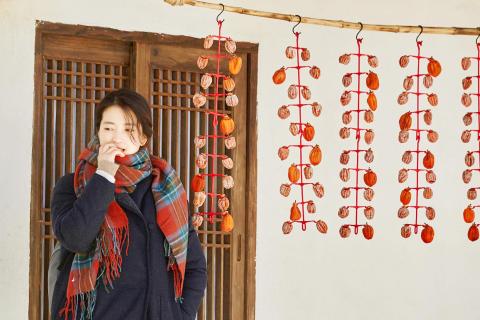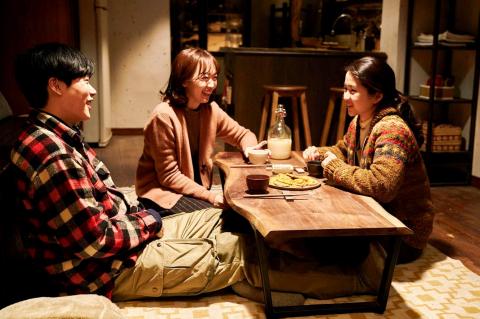In Little Forest, a young woman moves back to her childhood farming village in the countryside to escape the hardships and disappointments of city life. Even though it doesn’t offer any surprises, this slice-of-life drama by South Korean director Yim Soon-rye is an endearing and understated celebration of nature, food, friendship and family.
The film’s protagonist is Hye-won (Kim Tae-ri), a 20-something-year-old who aspires to be a teacher. She has just failed her teaching certification exam in Seoul, works a deadbeat part-time job at a convenience store and is on rocky terms with her boyfriend. Disenchanted and exhausted, she decides to return to her farming roots in the countryside, inhabiting her old, empty house which her mother (Moon So-ri) left behind after mysteriously vanishing years ago. Besides having a pet dog named Ogu for company, Hye-won reconnects with two childhood friends, fruits and vegetables farmer Jae-ha (Ryu Jun-yeol) and Eun-sook (Jin Ki-joo), who work in a nearby town as a bank teller.
Little Forest plays out in a slow, unhurried pace that beckons audiences to focus on the journey instead of the destination. It falls right into the mould of your typical, feel-good cinematic fare, but the film proves that a threadbare plot can still be effective with stellar execution. While the narrative mostly revolves around Hye-won re-adjusting to the country life, this is a small film with a very big heart, thanks to Yim’s meticulous direction and attention paid to the finest details.

Photo courtesy of Far East Film
Not only does the film’s four-act structure chronicle the changing of the seasons with vivid aesthetics, the climate transitions and growth of crops symbolically parallel Hye-won’s own year-long emotional renewal. In the opening scenes she begins rebuilding her life with uncertainty in a sparse, cold wintry environment; only in summer does she begin to reap the fruits of her labor with a plentiful harvest.
Audiences should be warned not to watch the film on an empty stomach — much of Little Forest is dedicated to attractive cooking scenes which demonstrate the redemptive power of homecooked comfort food. “I came back because I’m hungry,” quips Hye-won, lamenting how the instant convenience store meals in the city never filled her up.
Yim films these foodie scenes with tender, loving care: extended close-ups — including some Instagram-worthy flat lays — intricately detail the step-by-step process in preparing a spread of cuisines. Hye-won uses fresh ingredients from the natural environment to create Korean dishes such as kimchi sujebi (hand torn noodle soup) and makgeolli (rice wine), as well as edible plant items like fried acacia flower fritters.

Photo courtesy of Far East
It’s an assault of the senses all around: there’s something strangely therapeutic about watching (and listening to) Hye-won knead chewy dough, squelch rice grains in a bowl and delicately assemble layers of coloured flour to create a red bean steamed rice cake.
But far from being an indulgent display of food porn, cooking also serves as a conduit for our protagonist to revisit her past shared memories with her enigmatic mother, who passed down her boundless recipes and love for cooking to her. Veteran actress Moon as the absent matriarch appears in recurring flashbacks that offer glimpses of their sweet, bickering mother-daughter relationship, which also ultimately forms the emotional core of Little Forest.
Kim Tae-ri, who was last seen in political thriller 1987: When the Day Comes, is an absolute delight as the hardy, stubborn Hye-won determined to overcome the trials and tribulations in her life. Having a young actress carry an entire film is no mean feat, but Kim does it easily with her naturally likeable screen presence, managing to remain engaging onscreen even when she’s just shovelling snow off a driveway.
Popular actor Ryu Jun-yeol and newcomer Jin Ki-joo also deliver as her best friends, with the trio exuding winning chemistry as they squabble over jugs of milky-white makgeolli and candlelit bentos by the river.
“When things are hard, remember the scent of the sun, wind and rain,” muses Hye-won’s mother in a handwritten letter. With plenty of escapist appeal, Little Forest no doubt romanticizes the countryside as a rich, rural idyll where problems are easily solved, conveniently bypassing the share of difficulties faced by the farming community too.
Still, there’s something to be learned from the film’s humble appreciation of the simpler, tiny pleasures in life, be it staring out of a window listening to the sound of raindrops, fishing in the river bank in the dead of the night, or relishing the taste of dried persimmons in winter. It’s a much-needed reminder for all of us to stop and smell the roses every once in a while.

Google unveiled an artificial intelligence tool Wednesday that its scientists said would help unravel the mysteries of the human genome — and could one day lead to new treatments for diseases. The deep learning model AlphaGenome was hailed by outside researchers as a “breakthrough” that would let scientists study and even simulate the roots of difficult-to-treat genetic diseases. While the first complete map of the human genome in 2003 “gave us the book of life, reading it remained a challenge,” Pushmeet Kohli, vice president of research at Google DeepMind, told journalists. “We have the text,” he said, which is a sequence of

On a harsh winter afternoon last month, 2,000 protesters marched and chanted slogans such as “CCP out” and “Korea for Koreans” in Seoul’s popular Gangnam District. Participants — mostly students — wore caps printed with the Chinese characters for “exterminate communism” (滅共) and held banners reading “Heaven will destroy the Chinese Communist Party” (天滅中共). During the march, Park Jun-young, the leader of the protest organizer “Free University,” a conservative youth movement, who was on a hunger strike, collapsed after delivering a speech in sub-zero temperatures and was later hospitalized. Several protesters shaved their heads at the end of the demonstration. A

In August of 1949 American journalist Darrell Berrigan toured occupied Formosa and on Aug. 13 published “Should We Grab Formosa?” in the Saturday Evening Post. Berrigan, cataloguing the numerous horrors of corruption and looting the occupying Republic of China (ROC) was inflicting on the locals, advocated outright annexation of Taiwan by the US. He contended the islanders would welcome that. Berrigan also observed that the islanders were planning another revolt, and wrote of their “island nationalism.” The US position on Taiwan was well known there, and islanders, he said, had told him of US official statements that Taiwan had not

We have reached the point where, on any given day, it has become shocking if nothing shocking is happening in the news. This is especially true of Taiwan, which is in the crosshairs of the Chinese Communist Party (CCP), uniquely vulnerable to events happening in the US and Japan and where domestic politics has turned toxic and self-destructive. There are big forces at play far beyond our ability to control them. Feelings of helplessness are no joke and can lead to serious health issues. It should come as no surprise that a Strategic Market Research report is predicting a Compound